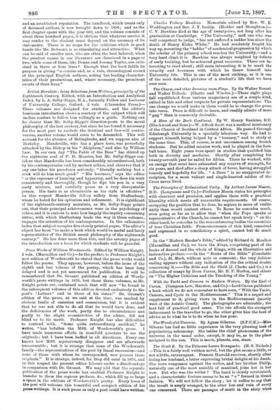British Moralists : being Selections from Writers, principally of the
Eighhteenth Century. Edited, with an Introduction and Analytical Index, by L. A. Selby-Bigge. M.A., formerly Fellow and Lecturer of University College, Oxford. 2 vols. (Clarendon Press.)-- These volumes are designed for students, and the editor's luminous introduction shows a mastery of the subject which will incline readers to follow him willingly as a guide. Nothing can be clearer than Mr. Selby-Bigge's direction-posts to the moral philosophy of the last century, but since he has found it necessary for the most part to exclude the deistical and free-will contro- versies, another volume would seem to be demanded. This will account for the absence of Bolingbroke, and we suppose also of Berkeley. Mandeville, who has a plate here, was powerfully attacked by the Bishop in his " Akiphron," and also by William Law. In our own day "The Fable of the Bees" has stirred up the righteous soul of F. D. Maurice, but Mr. Selby-Bigge con- siders that Mandeville has been considerably misunderstood, both by his contemporaries and by modern critics, and observes that if any one takes his paradoxes seriously, "literally nothing but a stick will do him much good." "His business," says the editor " is the exposure of humbug and hypocrisy, and he does his work consistently and thoroughly, though he dips his pen in a very nasty mixture, and carefully poses as a very disreputable person. His taste is as abominable as his style is effective." In this respect Mandeville differs widely from Shaftesbury, whom he hated for his optimism and refinement. It is significant of the eighteenth-century moralists, as Mr. Selby-Bigge points out, that their principal achievements were in the psychology of' ethics, and it is curious to note how largely the inquiry concerning virtue, with which Shaftesbury leads the way in these volumes, engages the attention of his contemporaries. In the exhaustive index that subject occupies five closely printed pages. The editor's object has been "to make a book which would be useful and fairly representative of the British moral philosophy of the eighteenth century." He has done more than this, and the seventy pages of the introduction are a boon for which students will be grateful.


































 Previous page
Previous page